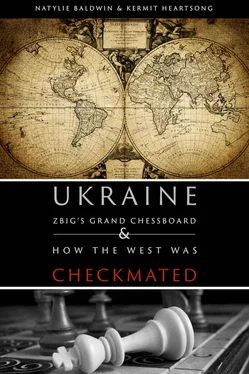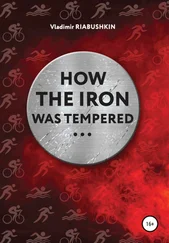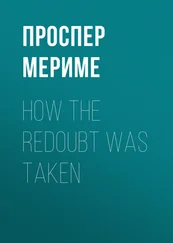Kermit Heartsong - Ukraine - ZBIG's Grand Chess Board & How The West Was Checkmated
Здесь есть возможность читать онлайн «Kermit Heartsong - Ukraine - ZBIG's Grand Chess Board & How The West Was Checkmated» весь текст электронной книги совершенно бесплатно (целиком полную версию без сокращений). В некоторых случаях можно слушать аудио, скачать через торрент в формате fb2 и присутствует краткое содержание. Год выпуска: 2015, Жанр: Политика, на английском языке. Описание произведения, (предисловие) а так же отзывы посетителей доступны на портале библиотеки ЛибКат.
- Название:Ukraine: ZBIG's Grand Chess Board & How The West Was Checkmated
- Автор:
- Жанр:
- Год:2015
- ISBN:нет данных
- Рейтинг книги:4 / 5. Голосов: 1
-
Избранное:Добавить в избранное
- Отзывы:
-
Ваша оценка:
- 80
- 1
- 2
- 3
- 4
- 5
Ukraine: ZBIG's Grand Chess Board & How The West Was Checkmated: краткое содержание, описание и аннотация
Предлагаем к чтению аннотацию, описание, краткое содержание или предисловие (зависит от того, что написал сам автор книги «Ukraine: ZBIG's Grand Chess Board & How The West Was Checkmated»). Если вы не нашли необходимую информацию о книге — напишите в комментариях, мы постараемся отыскать её.
Ukraine: ZBIG's Grand Chess Board & How The West Was Checkmated — читать онлайн бесплатно полную книгу (весь текст) целиком
Ниже представлен текст книги, разбитый по страницам. Система сохранения места последней прочитанной страницы, позволяет с удобством читать онлайн бесплатно книгу «Ukraine: ZBIG's Grand Chess Board & How The West Was Checkmated», без необходимости каждый раз заново искать на чём Вы остановились. Поставьте закладку, и сможете в любой момент перейти на страницу, на которой закончили чтение.
Интервал:
Закладка:
As of the publication date of this book, the new Ukrainian government has conducted an investigation charging three members of the Ukrainian police force for the massacre with no evidence of their guilt. Further, the Ukrainian government has consistently failed to investigate Right Sector and Maidan security forces involvement, despite overwhelming evidence. Oddly enough, one of the accused Ukrainian police officers charged with the sniper shooting is missing one of his hands. Reuters has also questioned the investigation.
Additionally, the US, EU, and the United Nations have all failed to press Ukrainian authorities for a thorough investigation. To date, only the Russian authorities have continued to call for a thorough investigation of this tragic incident.
Nonetheless, evidence continues to mount that places responsibility for the massacre of nearly 100 people on Right Sektor and various Maidan security forces.
Russian Aggression?
It is astounding that all the militarist hype surrounding the NATO conference, along with bombastic declarations of collective security and vows to [protect] “[NATO’s] members in Eastern Europe,” has been invoked with absolutely no credible proof, such as satellite images of Russian troop and tank movements, missile launches or aircraft incursions of Ukrainian territory. It’s like policy is being made on the basis of fantasy and preconceptions.
— Finian Cunningham, Strategic Culture Foundation
Russian aggression? It is difficult, if not impossible to fathom a mainstream media anchor or foreign or domestic news correspondent not entirely under the spell of Western propaganda, who could utter the phrase “Russian aggression” without an iota of actual evidence not reliant upon social media.
In one of President Putin’s yearly press conferences, he answered questions from a variety of the world’s reporters. President Putin was bereft of a teleprompter or a secret earpiece sprouting from a black box stealthily attached to his back. It is a feat that no Western leader, in the modern era, appears to have replicated.
One of the questions fielded by President Putin concerned Russia’s pursuit of aggressive policies. President Putin was quick to point out that not only was the US’s military budget 10 times that of Russia’s (Russia at $50 billion versus the US’s at $575 billion), but that while Russia only had two military bases outside of its borders (Kyrgystan, Tajikistan), the US had as many as 1,000 military bases spread throughout the world (Hitchens 2014). Of course, President Putin might have also mentioned serial and continuing breaches by NATO of the 1997 NATO Russia Founding Act, wherein it was agreed that the “permanent stationing of substantial combat forces to Eastern and Central Europe would be avoided.”
A further point with regard to Russia’s “imperial ambitions” relative to NATO’s would be Russia’s peaceful ceding of control of over 180 million people and roughly 700,000 square miles of valuable territory since 1989. NATO, on the other hand, has gained control of over 120 million people in the lands ceded by Russia, and roughly 400,000 square miles since 1989 (Hitchens 2014). So with many opinions to the contrary abounding in the West, the fact is that Russia has withdrawn into Russia, while the West — US and NATO, have steadily and aggressively moved to the Russian border.
As writer and geopolitical researcher Tony Cartalucci (2014) sums up:
The term “Russian aggression” has been inundating headlines across the Western media and even graces the title of a US Senate bill introduce this year — S. 2277—Russian Aggression Prevention Act of 2014. But what “aggression” is the West referring to? A cursory look at Russian history over the past 500 years compared to say, Britain, France, or even America and its “Manifest Destiny,” portrays Russia as a nation preoccupied within and along its borders, not in hegemonic, global expansion. The idea of far-flung former colonies is one unique to the British, French, Dutch, and Spanish. Even today geopolitical, socioeconomic, and even outright military intervention in these former colonies is exclusively the pursuit of the United States and Europe. (Cartalucci 2014)
In the twenty-first century, it is not Russia whose military bases can be found in 150 of the world’s 200 nations (Russian bases can only be found in 2 countries). It is not the Russians who annually spend nearly one trillion dollars on defense (though it could be much more, given the various black budgets). It is not the Russians whose drones daily murder innocent men, women, children, the aged, wedding party and funeral attendees, or those who hide in bomb shelters. It is not the Russians who have serially invaded and destroyed nation-states thousands of miles from its borders, under some Orwellian pretense always found lacking an iota of truth or, simply, based upon a pack of lies. It is not the Russians who imprison and torture men, women, and children at black sites across the world and keep international citizens imprisoned for years with no evidence or trial. No, it is the US that is responsible and guilty in each of the aforementioned cases for its relentless, serial aggression abroad these past fifty years and for the deaths of countless millions. Russian aggression?
A 2013 Gallup poll administered to people in sixty-eight countries asked, “Which country do you think is the greatest threat to peace in the world today?” The results should give the mainstream media, all organs of the US government, and US citizens pause. The replies to the Gallup poll were (Gallup 2013):
1 United States 24%
2 Pakistan 8%
3 China 6%
4 Afghanistan, Iran, Israel, North Korea, each 5%
5 India, Iraq, Japan, each 4%
6 Syria 3%
7 Russia 2%
8 Australia, Germany, Palestinian territories, Saudi Arabia, Somalia, South Korea, UK, each 1%
Yes, it is US aggression that the world truly fears, while “Russian aggression” is at a distant seventh place with a mere 2 percent of the vote.
What might you ask is the probable basis for such a response? In an article entitled, “US Empire Reaches Breaking Point: Greatest Threat to Humanity, Time to End It,” authors Kevin Zeese and Margaret Flowers (2014) recount some of the possible determinants as outlined by author and historian William Blum, in his book, Rogue State: A Guide to the World’s Only Superpower, published in 2000. Blum’s account points to the following reasons why the US has attained the mantle of “greatest threat to peace”:
•The attempted overthrow of more than 50 foreign governments, most of which were democratically elected
•The dropping of bombs on people of more than 30 countries
•The attempted assassination of more than 50 foreign leaders
•The attempt to suppress populist or nationalist movements in 20 countries
•The gross interference in democratic elections in at least 30 countries (Blum 2000)
In light of the above, one is hard pressed to come to terms with what is now termed “Russian aggression.” Is this a claim based upon psychological projection, Machiavellian duplicity, or, perhaps, mass hysteria resulting from prolonged mis/disinformation and propaganda campaigns? Certainly historians, if we should survive this current period, will be curious to uncover the reason for this colossal disconnect from reality.
Of course, there are a multitude of other factors that count the term “Russian aggression” as an enormous red herring. The Obama Administration’s Eastern Pivot, which has prodded the sleeping Japanese military machine awake in order to aggress China, is, as Zeese and Flowers (2014) point out, one such indication:
Already there have been tense moments between China and Japan with its ally, the US. Last November there were multiple challenges as Japan and the US violated the “Air Defense Zone” of China resulting in China scrambling fighter jets over the East China Sea in response. Tensions will likely rise as the US has now brought drones into the Asian Pacific which are housed on military bases in Japan. (Zeese 2014)
Читать дальшеИнтервал:
Закладка:
Похожие книги на «Ukraine: ZBIG's Grand Chess Board & How The West Was Checkmated»
Представляем Вашему вниманию похожие книги на «Ukraine: ZBIG's Grand Chess Board & How The West Was Checkmated» списком для выбора. Мы отобрали схожую по названию и смыслу литературу в надежде предоставить читателям больше вариантов отыскать новые, интересные, ещё непрочитанные произведения.
Обсуждение, отзывы о книге «Ukraine: ZBIG's Grand Chess Board & How The West Was Checkmated» и просто собственные мнения читателей. Оставьте ваши комментарии, напишите, что Вы думаете о произведении, его смысле или главных героях. Укажите что конкретно понравилось, а что нет, и почему Вы так считаете.











